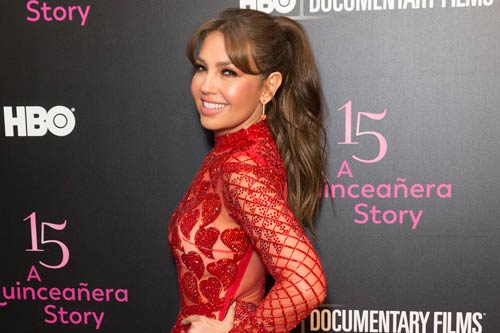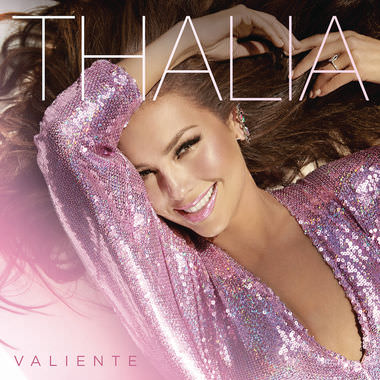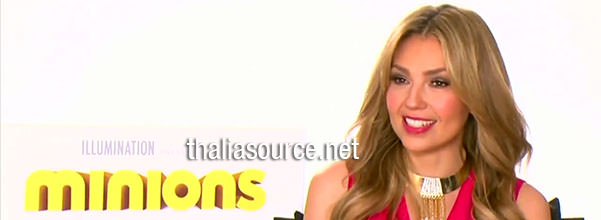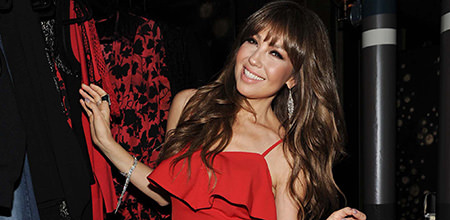The singer-songwriter talks coming-of-age for Latinas in contemporary USA.

But every girl has her own story -- her own struggles, insecurities and pressures that come with being raised Latina in this day and age. For award-winning singer-songwriter and veteran actor Thalia, who directed the upcoming HBO docuseries 15: A Quinceañera Story, her moment was marked with both triumph and a sense of loss.
"The anxieties for the Quinceañera is like what is this? What is going to happen after I turn 15?… In my case, I didn’t have my father. My father died when I was six years old. It was like… who am I going to dance with?" Thalia shares with Billboard.
Even with her father's absence, however, Thalia was as eager to commemorate her special day in a big way: "Instead of celebrating it in a salon or in my house, I decided to do it in a club with music. I went so against everything because that’s me. [Laughs]
On Dec. 19-22, HBO will premiere 15: A Quinceañera Story, a collection of four short documentary films, executive produced by music mogul Tommy Mottola and co-directed by Emmy-winner Matthew O'Neill, alongside Thalia herself.
Billboard sat down with Thalia, who spoke at length about some of the girls in the short films -- Ashley, Rosi and Zoey -- and why the docuseries has arrived in such timely fashion, suggesting "this America" will benefit from watching.
What was your Quinceañera like?
It was so different, because I like to go against everything. [Laughs] So instead of having a big dress, I had like a very silhouette dress [that went] all the way down, with high gloves. It was very '80s.
And instead of celebrating it in a salon or in my house, I decided to do it in a club with music. I went so against everything because that's me. [Laughs] But after that, at 16 years old, I had the chance to understand the tradition, and fell in love with what Quinceañera really is, because I was a part of the big [Quinceañera juvenile telenovela], where I co-starred.
It was like the first time that I [experienced] the big dress, all of that, and I fell in love with the tradition. It's been with me through all these years of my career. If I have a concert and I don't sing "Quinceañera," everybody's like, 'Why you didn't sing that song?'
Were there any pressures that you remember feeling turning 15, 16 years old?
No, it was never a pressure. It was always -- it's a magical moment. Maybe the anxiety is wondering what is [it] going to be [like] turning into a woman? You know, the fantasy, the anxieties for the Quinceañera is like what is this? What is going to happen after I turn 15? Maybe it's more about that.
In my case, I didn't have my father. My father died when I was six years old. It was like… who am I going to dance with?
What are some of the struggles you saw the girls undergo?
One of these Quinceañeras, Rosi, had trouble trying to go to Cuba to celebrate her Quinceañera there, because the grandfather cannot get a visa. Another girl that we follow in the story is Ashley. She is an amateur boxer and the mother is a DREAMer, but the father has been deported. And the coach who is an amazing, loving father figure to her is in the deportation procedure. So, you know, everybody has their own story.
Can you speak more on Ashley, the boxer?
She is living in East L.A. And that's a very shocking story, because you see how they work, see how passionate she is with her boxing. And the mother and her, they just work in the free time that this girl has. They make tamales together and sell it. They do everything possible to raise money, and to make this incredible, amazing celebration [happen]. It's impossible to hold your emotions when you see these four mini-documentaries.
Zoey is another story that is just incredible. She's a young Mexican-American. She also lives in LA. She was assigned male at birth, and now she's celebrating her Quinceañera with her trans madrinas [godmothers] So they are happy because they never had their own celebrations. For them, Zoey [is waving] a new flag for a new generation. She's this hope for a lot of new young girls, and we didn't have that.
Was there a moment where you found yourself incredibly emotional or incredibly proud to be Latina?
Listen, through the whole experience, I learned so much and I discovered so many aspects of the different colors of our culture. I've been chasing this dream for years, and it's been taking me three years to put it together. Of course finding the perfect team and finding the people that shared my vision and understood the importance of Quinceañas in our culture.
It took us like two years to put the team together, and to me, working as the director with Emmy winner Matthew O'Neil, he is key for this. He got me. He understood me. He wanted to do exactly how I had in mind. We explored it together. It was beautiful. It was a beautiful experience. We cried. The editing room was like, "Oh my god. Stop it there. Rewind it. Let's watch it." It was really incredible working and learning through all these stories.
Did any of the girls teach you something or did something particular personally resonate with you?
I think with Zoey -- the one story that really was closer to my heart. All of them are, but this one was unique for me because she was so sweet. Her mother is incredible, and it totally reminded me of my mother and I. That relationship of us against the world, and that's exactly how I feel [about my] mother -- she's my warrior. I have so much respect for Zoey's mother and for Zoey, because it totally was like a mirror. It was like looking at myself at that age with my mother, and that's why that's so beautiful to me.
I'm so excited to share these stories. It is going to be a beautiful learning experience for new cultures, for new audiences, to embrace and love our culture. Especially right now with all the problems that American Latinas are having to define our future in this America. It's gonna be beautiful.








